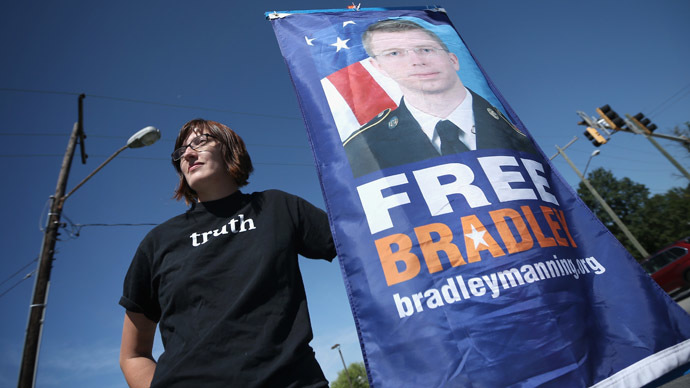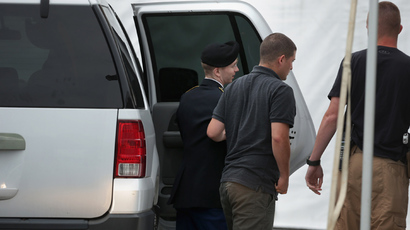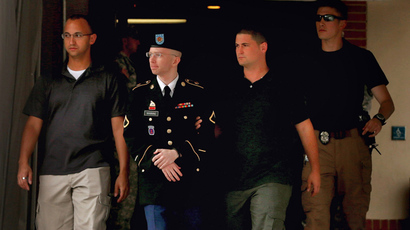Manning opened new era of optimism, leaving none for himself – WikiLeaks

Although Bradley Manning has been found not guilty of charges of aiding the enemy, WikiLeaks has little optimism about the whistleblower’s fate, considering how biased the trial against him was, the organization’s spokesman, Kristinn Hrafnsson, told RT.
US Army private Manning, who is responsible for the largest leak of classified documents in American history, was found guilty of 20 remaining charges, meaning that he still faces the possibility of up to 136 years behind bars.
Among other things, the 25-year-old has been convicted of five counts of espionage as well as theft and computer fraud, with the sentencing to begin on Wednesday morning.
WikiLeaks spokesman, Kristinn Hrafnsson, believes the harsh way the US treated Manning won’t stop other whistleblowers from coming forward, holding NSA leaker, Edward Snowden as an example.
RT:What is your reaction to the verdict?
Kristinn Hrafnsson: Well, of course I’m pleased that the
judge decided to throw out the most serious charges of aiding the
enemy, which of course was ludicrous to start with and would’ve
meant, basically, that proper journalism was treason. However, we
have now 20 charges that he’s found guilty of and which I
believe, could mean up to 100 years imprisonment. So, he’s
obviously facing a long time in prison. Especially, when you
think about how this trial has been carried out by Judge [Denise]
Lind, one isn’t filled with any optimism. Last week, the judge
allowed the prosecution to change some of the charges on the last
day of the trail. The trail has been partly closed off to
journalists. Journalists have been intimidated. So, there’s no
big room for optimism.
RT:What visible good did Manning bring? No one has ever been brought to book, for instance, for some of the thing he exposed.
KH: The thing that he has exposed, being the source of this information that he has admitted to have led to profound social and political changes in the Middle East, in part. If one listens to the voices from Tunisia, he’s partly responsible for contributing in a catalytic way to the Arab Spring, which is amazing. He has given us an in-depth insight into the horrors of the Iraq and the Afghan wars. Insight into the information that was concealed and hidden from the general public. The fact that the allied forces were turning over detainees to the Al Maliki Government where they were tortured – and they knew perfectly well about that, for example. The number of those, who [were] killed in the wars that was meticulously gathered by the US forces, but officially denied that they were gathering this information. So, we have learned a lot from these revelations and he’s one of the most important whistleblowers in history.
RT:The critics might say: ‘yes, he raised public awareness, but has anything changed?’
KH: Things have changed. We have seen now a new era beginning and expansion of the limits of journalism. An ear that of course began prior to 2010, but with the WikiLeaks revelation in 2010 the world saw a new opportunity and a chance for information getting out bypassing the mainstream media, who often act as lapdogs of administrations – instead of being the watchdogs they should be. We’ve seen this trend continuing and now we have Snowden stepping forth and informing us about the most grave attack on privacy in the world in history, far surpassing what the Stasi did in East Germany back in the cold war days. So, this is a continuation, it’s a new reality, with new technology and the new media online and it should be… I think, we can look with optimism and hopefully see changes in the future. And you can see the changes already.
RT:What hope is there now for anyone working for the US government, whose conscience tells them ‘this is wrong’, to come forward? When they’re breaching secrets, what they can get away with? Is the picture any clearer for them now?
KH: The picture, at least, is clearer that they will not face life imprisonment or a death sentence on ridiculous charge for aiding the enemy if they’re revealing issues and information showing war crimes. We have seen that despite the way that Bradley Manning was treated, being tortured in prison, in isolation, in solitary confinement for almost a year – it hasn’t stopped whistleblowers. There are still brave people out there, who act on their conscience and wit public interest in mind and have blown the whistle. That’s not going to stop.














